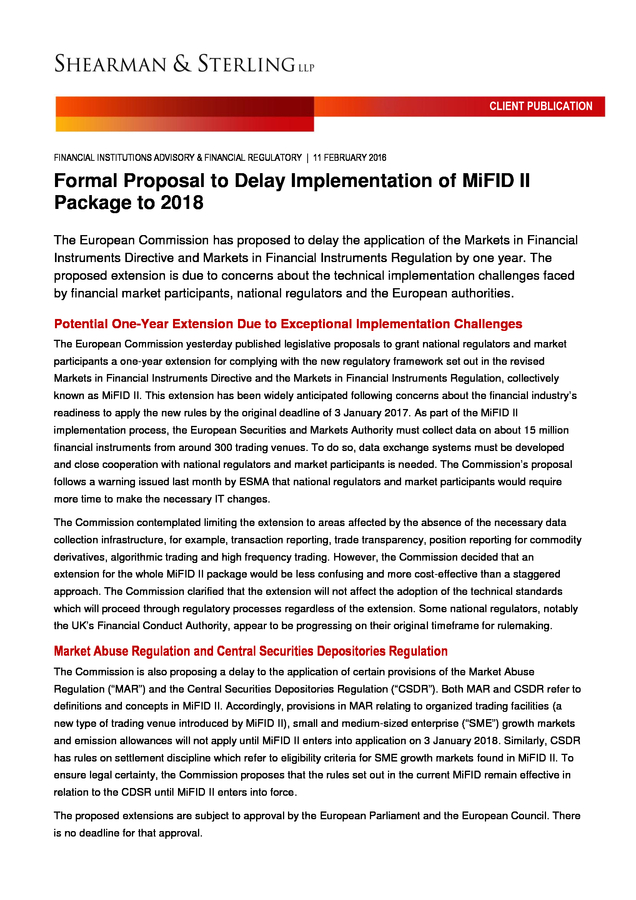Formal Proposal to Delay Implementation of MiFID II Package to 2018 – February 11, 2016
Shearman & Sterling
Description
CLIENT PUBLICATION
FINANCIAL INSTITUTIONS ADVISORY & FINANCIAL REGULATORY | 11 FEBRUARY 2016
Formal Proposal to Delay Implementation of MiFID II
Package to 2018
The European Commission has proposed to delay the application of the Markets in Financial
Instruments Directive and Markets in Financial Instruments Regulation by one year. The
proposed extension is due to concerns about the technical implementation challenges faced
by financial market participants, national regulators and the European authorities.
Potential One-Year Extension Due to Exceptional Implementation Challenges
The European Commission yesterday published legislative proposals to grant national regulators and market
participants a one-year extension for complying with the new regulatory framework set out in the revised
Markets in Financial Instruments Directive and the Markets in Financial Instruments Regulation, collectively
known as MiFID II. This extension has been widely anticipated following concerns about the financial industry’s
readiness to apply the new rules by the original deadline of 3 January 2017. As part of the MiFID II
implementation process, the European Securities and Markets Authority must collect data on about 15 million
financial instruments from around 300 trading venues.
To do so, data exchange systems must be developed and close cooperation with national regulators and market participants is needed. The Commission’s proposal follows a warning issued last month by ESMA that national regulators and market participants would require more time to make the necessary IT changes. The Commission contemplated limiting the extension to areas affected by the absence of the necessary data collection infrastructure, for example, transaction reporting, trade transparency, position reporting for commodity derivatives, algorithmic trading and high frequency trading. However, the Commission decided that an extension for the whole MiFID II package would be less confusing and more cost-effective than a staggered approach.
The Commission clarified that the extension will not affect the adoption of the technical standards which will proceed through regulatory processes regardless of the extension. Some national regulators, notably the UK’s Financial Conduct Authority, appear to be progressing on their original timeframe for rulemaking. Market Abuse Regulation and Central Securities Depositories Regulation The Commission is also proposing a delay to the application of certain provisions of the Market Abuse Regulation (“MAR”) and the Central Securities Depositories Regulation (“CSDR”). Both MAR and CSDR refer to definitions and concepts in MiFID II.
Accordingly, provisions in MAR relating to organized trading facilities (a new type of trading venue introduced by MiFID II), small and medium-sized enterprise (“SME”) growth markets and emission allowances will not apply until MiFID II enters into application on 3 January 2018. Similarly, CSDR has rules on settlement discipline which refer to eligibility criteria for SME growth markets found in MiFID II. To ensure legal certainty, the Commission proposes that the rules set out in the current MiFID remain effective in relation to the CDSR until MiFID II enters into force. The proposed extensions are subject to approval by the European Parliament and the European Council.
There is no deadline for that approval. . Background to MiFID MiFID was introduced in 2007 to further integrate and improve competition within the EU financial market, focusing on securities markets, investment intermediaries and trading venues. However, the financial crisis revealed weaknesses in areas such as trading, transparency, oversight of financial markets, trading competition and clearing of financial instruments. MiFID II aims to address these weaknesses with an overhaul of trading rules, including new conduct of business requirements, extending the number of regulated financial products and moving a significant part of OTC trading onto regulated platforms. 1 CONTACTS Barney Reynolds London +44 20 7655 5528 barney.reynolds@shearman.com Thomas Donegan London +44 20 7655 5566 thomas.donegan@shearman.com Hervé Letréguilly Paris +33 1 5389 7130 hletreguilly@shearman.com Tobia Croff Milan +39 02 0064 1509 tcroff@shearman.com Kolja Stehl Frankfurt/London +44 20 7655 5864 kolja.stehl@shearman.com James Campbell London +44 20 7655 5570 james.campbell@shearman.com Aysuria Chang London +44 20 7655 5792 aysuria.chang@shearman.com Sandy Collins London +44 20 7655 5601 sandy.collins@shearman.com Oliver Linch London +44 20 7655 5715 oliver.linch@shearman.com Ben McMurdo London +44 207 655 5906 ben.mcmurdo@shearman.com Ellerina Teo London +44 20 7655 5070 ellerina.teo@shearman.com 1 You may like to see our client notes on other aspects of MiFID and MiFID II: “MiFID II: The Regulation of Market Makers,” available here; “MiIFD II – Transaction Reporting,” available here; “MiFID II: Commodity Derivatives and Emissions,” available here; “The Revised EU and US Regulatory Frameworks for Commodity Derivatives,” available here; and “A Changing Landscape: The MIFID II Legislation Proposal,” available here. ABU DHABI | BEIJING | BRUSSELS | DUBAI | FRANKFURT | HONG KONG | LONDON | MENLO PARK | MILAN | NEW YORK PARIS | ROME | SAN FRANCISCO | SÃO PAULO | SAUDI ARABIA* | SHANGHAI | SINGAPORE | TOKYO | TORONTO | WASHINGTON, DC This memorandum is intended only as a general discussion of these issues. It should not be regarded as legal advice.
We would be pleased to provide additional details or advice about specific situations if desired. 9 APPOLD STREET | LONDON | UK | EC2A 2AP Copyright © 2016 Shearman & Sterling LLP. Shearman & Sterling LLP is a limited liability partnership organized under the laws of the State of Delaware, with an affiliated limited liability partnership organized for the practice of law in the United Kingdom and Italy and an affiliated partnership organized for the practice of law in Hong Kong. *Abdulaziz Alassaf & Partners in association with Shearman & Sterling LLP 2 . . . . .
To do so, data exchange systems must be developed and close cooperation with national regulators and market participants is needed. The Commission’s proposal follows a warning issued last month by ESMA that national regulators and market participants would require more time to make the necessary IT changes. The Commission contemplated limiting the extension to areas affected by the absence of the necessary data collection infrastructure, for example, transaction reporting, trade transparency, position reporting for commodity derivatives, algorithmic trading and high frequency trading. However, the Commission decided that an extension for the whole MiFID II package would be less confusing and more cost-effective than a staggered approach.
The Commission clarified that the extension will not affect the adoption of the technical standards which will proceed through regulatory processes regardless of the extension. Some national regulators, notably the UK’s Financial Conduct Authority, appear to be progressing on their original timeframe for rulemaking. Market Abuse Regulation and Central Securities Depositories Regulation The Commission is also proposing a delay to the application of certain provisions of the Market Abuse Regulation (“MAR”) and the Central Securities Depositories Regulation (“CSDR”). Both MAR and CSDR refer to definitions and concepts in MiFID II.
Accordingly, provisions in MAR relating to organized trading facilities (a new type of trading venue introduced by MiFID II), small and medium-sized enterprise (“SME”) growth markets and emission allowances will not apply until MiFID II enters into application on 3 January 2018. Similarly, CSDR has rules on settlement discipline which refer to eligibility criteria for SME growth markets found in MiFID II. To ensure legal certainty, the Commission proposes that the rules set out in the current MiFID remain effective in relation to the CDSR until MiFID II enters into force. The proposed extensions are subject to approval by the European Parliament and the European Council.
There is no deadline for that approval. . Background to MiFID MiFID was introduced in 2007 to further integrate and improve competition within the EU financial market, focusing on securities markets, investment intermediaries and trading venues. However, the financial crisis revealed weaknesses in areas such as trading, transparency, oversight of financial markets, trading competition and clearing of financial instruments. MiFID II aims to address these weaknesses with an overhaul of trading rules, including new conduct of business requirements, extending the number of regulated financial products and moving a significant part of OTC trading onto regulated platforms. 1 CONTACTS Barney Reynolds London +44 20 7655 5528 barney.reynolds@shearman.com Thomas Donegan London +44 20 7655 5566 thomas.donegan@shearman.com Hervé Letréguilly Paris +33 1 5389 7130 hletreguilly@shearman.com Tobia Croff Milan +39 02 0064 1509 tcroff@shearman.com Kolja Stehl Frankfurt/London +44 20 7655 5864 kolja.stehl@shearman.com James Campbell London +44 20 7655 5570 james.campbell@shearman.com Aysuria Chang London +44 20 7655 5792 aysuria.chang@shearman.com Sandy Collins London +44 20 7655 5601 sandy.collins@shearman.com Oliver Linch London +44 20 7655 5715 oliver.linch@shearman.com Ben McMurdo London +44 207 655 5906 ben.mcmurdo@shearman.com Ellerina Teo London +44 20 7655 5070 ellerina.teo@shearman.com 1 You may like to see our client notes on other aspects of MiFID and MiFID II: “MiFID II: The Regulation of Market Makers,” available here; “MiIFD II – Transaction Reporting,” available here; “MiFID II: Commodity Derivatives and Emissions,” available here; “The Revised EU and US Regulatory Frameworks for Commodity Derivatives,” available here; and “A Changing Landscape: The MIFID II Legislation Proposal,” available here. ABU DHABI | BEIJING | BRUSSELS | DUBAI | FRANKFURT | HONG KONG | LONDON | MENLO PARK | MILAN | NEW YORK PARIS | ROME | SAN FRANCISCO | SÃO PAULO | SAUDI ARABIA* | SHANGHAI | SINGAPORE | TOKYO | TORONTO | WASHINGTON, DC This memorandum is intended only as a general discussion of these issues. It should not be regarded as legal advice.
We would be pleased to provide additional details or advice about specific situations if desired. 9 APPOLD STREET | LONDON | UK | EC2A 2AP Copyright © 2016 Shearman & Sterling LLP. Shearman & Sterling LLP is a limited liability partnership organized under the laws of the State of Delaware, with an affiliated limited liability partnership organized for the practice of law in the United Kingdom and Italy and an affiliated partnership organized for the practice of law in Hong Kong. *Abdulaziz Alassaf & Partners in association with Shearman & Sterling LLP 2 . . . . .













